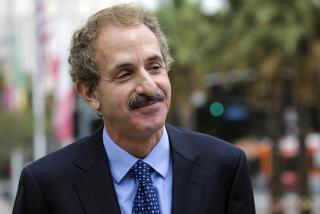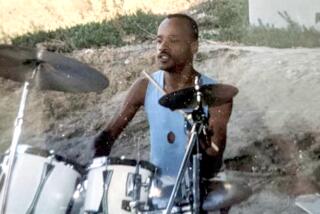Capital Wins Ruling on Trial Access
- Share via
The divorce trial of an executive with Los Angeles-based investment giant Capital Group Cos. will be partly closed to the public to prevent disclosures about the firm’s inner workings, a Superior Court judge decided Monday.
The ruling was a victory for the privately held company, which manages more than $1 trillion for clients worldwide. The firm has long closely guarded details of its own finances, including its revenue and profit.
Judge John Sandoz made his decision over the objection of a 1st Amendment attorney representing the Los Angeles Times. The newspaper argued that Capital’s desire for secrecy was overridden by the public’s constitutional right to open trials.
The company’s attorneys, appearing on what was to be the first day of the divorce trial of Capital executive Timothy Armour and wife Nina Ritter, asserted that the firm could be damaged if certain information about its business -- including executive pay levels and stock awards -- became public via trial documents or testimony.
One issue in the divorce is Ritter’s claim on half of the 50,000 Capital shares that she and Armour hold in a trust. In an interview last week, Ritter, 45, said she wanted to continue holding an interest in the stock after the divorce rather than accept its current cash value in a settlement.
Ritter said she believed that the stock would be worth much more over time, and expected documents and testimony during the trial to establish the true long-term value of the shares.
But Capital’s bylaws don’t allow nonemployees to own stock without the firm’s permission. In March, Delaware Chancery Court, the nation’s premier business court, ruled in favor of Capital in a suit the company brought against Ritter to block her claim to the shares once she and Armour were divorced.
Armour, 45, filed for divorce from Ritter in 2003.
Capital, which manages the popular American Funds group, told Judge Sandoz on Monday that its corporate culture and competitive position would be threatened if now-secret details about stock ownership, executive pay levels and other financial issues were publicly disclosed. Many of those details are likely to come up in the trial, based on exhibit and witness lists presented to the court.
Because the 74-year-old firm is owned by about 300 partners, rather than by public shareholders, Capital isn’t required to disclose its finances to outsiders.
Philip De Toledo, the company’s chief financial officer, said in a filing with the court that he believed it would be “very harmful to [Capital’s] corporate culture and the morale of its employees for [the firm’s] private compensation process and information to be exposed.” Employees could be “distracted or demoralized by compensation comparisons and internal competition,” he said.
In addition, “Competitors could attempt to use information about [Capital’s] compensation strategies and awards to strengthen their own competitive positions and to solicit [the firm’s] employees to work for them,” De Toledo said.
Capital, which has 7,000 employees, has been the best-selling U.S. mutual fund company for the last three years.
Sandoz, in deciding for Capital, said he was convinced that “their proprietary information would cause some serious problems if revealed in open court.”
The judge said that trial documents containing now-secret information about Capital would be sealed, and that the courtroom would be closed during testimony involving that information, but would be open during other testimony.
California judges have the ability to restrict public access to trials, but they must demonstrate that the basis for the decision overrides the general presumption that court proceedings should be open.
Susan Seager, an attorney at Davis Wright Tremaine who represented The Times, asserted that cloaking portions of the trial would set a worrisome precedent for corporate secrecy efforts in other divorce cases.
Ritter’s attorney, Dennis Wasser, said he was willing to have certain documents sealed but wanted the trial to be open. Armour’s attorneys filed a brief supporting Capital.
More to Read
Inside the business of entertainment
The Wide Shot brings you news, analysis and insights on everything from streaming wars to production — and what it all means for the future.
You may occasionally receive promotional content from the Los Angeles Times.








